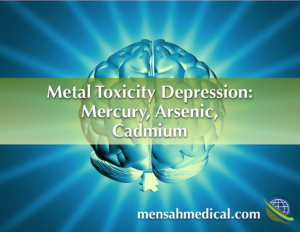
Yeast Toxicity Tips + Zucchini Chicken Soup by Sami G
Yeast Toxicity Tips: There was a time in my life when I really struggled with gut dysbiosis (microbial imbalance). Back then I thought I was
Obsessive-compulsive disorder (OCD) is a mental health condition characterized by recurrent, unwanted thoughts and distractions (obsessions) that lead to strong urges to perform certain behaviors or rituals (compulsions). It can be debilitating in some cases, affecting day-to-day functioning and quality of life. Symptoms may vary in severity, but typically involve repetitive thoughts or behaviors that seem impossible to ignore or control.
OCD is different from normal worries and habits as it involves intense feelings of distress and anxiety that manifest in compulsions such as handwashing or counting items. People with OCD often feel stuck in a cycle of obsessive thinking and compulsive behavior, repeatedly performing the same actions despite wanting to stop them; they may even recognize that their behavior is irrational, but feel powerless against it.
Obsessive-Compulsive Disorder (OCD) is characterized by intrusive and distressing thoughts known as obsessions, which can lead to a strong urge to perform certain behaviors or rituals (compulsions). Common symptoms of OCD include:
There are several types of Obsessive-Compulsive Disorder (OCD), including:
Conventional treatment for Obsessive-Compulsive Disorder (OCD) typically involves a combination of cognitive behavioral therapy (CBT) and medications.
CBT focuses on helping the individual understand and manage their thoughts and feelings in order to lessen their anxiety. It also teaches them relaxation techniques, problem-solving methods, and how to challenge and reframe their negative thoughts.
Antidepressant medications are commonly prescribed to help reduce obsessive thoughts, improve mood, and increase concentration. The two most common classes of prescribed drugs for OCD are selective serotonin reuptake inhibitors (SSRIs) and tricyclic antidepressants (TCAs).
An orthomolecular understanding of Obsessive-Compulsive Disorders (OCD) suggests that the condition is caused by an imbalance in essential molecules in the body, often due to nutrient deficiencies or imbalances, as well as epigenetic factors. Throughout years of research and clinical practice we have found that OCD is often tied to undermethylation, which typically correlates with low serotonin activity.
A natural approach to healing OCD focuses on providing the necessary nutrients and supplements to restore balance within the body. This includes reducing processed sugars and refined carbohydrates, avoiding food additives, and eating organic whenever possible. Additionally, supplementation with magnesium, zinc, B-vitamins, Vitamin C, and antioxidants may help support brain health.
The Mensah Medical team works with various patients diagnosed with obsessive-compulsive disorder. We treat these patients with a targeted and individualized nutrient therapy protocol based on diagnostic lab testing. By correcting imbalances of essential nutrients in the body, Mensah Medical’s approach is safe, natural, and effective. Mensah Medical’s protocol will not only rebalance chemistry but also alleviate many of the symptoms associated with Obsessive-Compulsive Disorder (OCD). If you or a loved one is currently on an antidepressant and/or another psychiatric medication, Mensah Medical physicians will work to first restore your chemistry, rebuild your foundation, and then look to work with your physician to slowly decrease your medication.
For more information, watch our video entitled: “iObsessed: The Many Forms of OCD: Discover How Our Brains Get Re-Wired And Ways To Heal The Brain” on our YouTube Channel.
You should seek treatment at Mensah Medical after you have been diagnosed with obsessive-compulsive disorders by your primary physician, psychiatrist, or other medical caregivers. If you are seeking treatment that is non-medicated or if prescribed medications are not effective, Mensah Medical may be right for you.
The cause of OCD is not known, however, there are several factors that may contribute to the development of the disorder.
Genetics appear to play a role in OCD as it tends to run in families and individuals with close relatives who have OCD are more likely to develop the disorder. In addition, research suggests that abnormalities in certain brain circuits and neurotransmitter systems, such as serotonin, may be involved in the development of OCD. Environmental factors and stressful life events or traumatic experiences can also affect genetic expression and trigger OCD symptoms.
Several risk factors for Obsessive-Compulsive Disorder (OCD) have been identified, making certain individuals more vulnerable to the development of the disorder.
Genetics appear to be a major factor in the development of OCD, with studies showing that those with close relatives who are affected by OCD are at an increased risk.
Certain psychological traits such as perfectionism and anxiety can also increase one’s vulnerability to developing OCD. In addition, stressful life events or traumatic experiences may trigger OCD symptoms or worsen existing ones.
Underlying biochemical imbalances such as undermethylation may lead certain individuals to be more susceptible to developing OCD. Recent research indicates that mothers who supplemented with folic acid for prolonged periods of time during pregnancy can be a contributing factors to their children being undermethylated.
Obsessive-Compulsive Disorder (OCD) can lead to numerous complications that can affect one’s quality of life.
People with OCD often suffer from depression and other anxiety disorders, such as social anxiety disorder and panic disorder. This can lead to an inability to participate in activities, interact with others, and the ability to work or perform schoolwork.
Another complication of OCD is poor impulse control and poor decision-making resulting from the compulsions associated with the condition. People with OCD may make decisions that are not in their best interest due to their obsessions being more important than day-to-day responsibilities.
Additionally, people with OCD may experience social isolation, as they may be embarrassed by their symptoms or find it difficult to interact with others due to intrusive thoughts or compulsions.
Although there is no known way to prevent Obsessive-Compulsive Disorder (OCD), there are ways to reduce the risks associated with developing the disorder.
Maintaining a healthy and balanced lifestyle is important for preventing OCD, as it helps to reduce stress which can be a trigger for OCD symptoms. Regular exercise, a healthy diet, adequate sleep, and other self-care practices can help keep stress levels low.
Spending time engaging in activities that promote relaxation can also be helpful in preventing OCD. Examples of these activities include mindfulness and meditation, yoga, creative activities such as painting or music, and spending quality time with friends and family.
Finally, seeking help from a mental health professional when needed is another way to reduce the risk of developing OCD symptoms. Treatment options such as psychotherapy or medication can help manage symptoms of OCD in those who are affected by the condition.
The diagnosis of Obsessive-Compulsive Disorder (OCD) can be made by a mental health professional, such as a psychiatrist or psychologist, through psychological assessment. This assessment typically involves gathering information about the individual’s symptoms, history, and lifestyle.
The clinician will also likely ask questions about the individual’s thoughts and feelings to gain an understanding of the person’s experience with OCD. In some cases, additional tests may be used to rule out or detect any medical or other mental health condition that might contribute to OCD symptoms.
If OCD is suspected, treatment can begin right away based on the diagnosis. Treatment typically includes both medication and psychotherapy approaches to help manage the symptoms of OCD.
Incorporating lifestyle and home remedies into the treatment of Obsessive-Compulsive Disorder (OCD) can help improve symptoms and manage the condition more effectively.
Maintaining a healthy lifestyle by eating a balanced diet, getting regular exercise, and getting enough sleep can be helpful in managing OCD symptoms. Regular physical activity releases endorphins that can help reduce stress levels, which is important for people with OCD since stress is often a trigger for unwanted thoughts and behaviors.
Spending time engaging in activities that promote relaxation, such as mindfulness and meditation, yoga, or creative activities like painting or music, can also be beneficial in managing OCD.
Other home remedies include developing self-care routines or rituals that focus on taking care of one’s mental health needs, such as setting aside time to spend with loved ones or engaging in activities that bring joy. Additionally, seeking professional help from a qualified mental health provider when needed is a key part of treating OCD more effectively.
In addition to conventional medicine treatments, there are alternative medicine or natural medicine approaches that can be used to help manage the symptoms of Obsessive-Compulsive Disorder (OCD).
Vision therapy using prisms and eye movements is a type of treatment that has been studied for its effectiveness in reducing OCD symptoms. Acupuncture is another possible approach that has been studied for its potential to reduce stress levels associated with OCD.
Finally, mindfulness practices such as meditation, yoga, and tai chi have been used to help reduce anxiety associated with OCD. It is important to speak with your healthcare provider before starting any alternative medicine or natural treatment for OCD.
Prior to your first appointment at Mensah Medical, you will be required to complete a new patient intake form as well as a patient history form. These forms must be submitted to Mensah Medical before an appointment can be scheduled. For Outreach Clinic appointments these forms must be submitted one week before the scheduled Outreach. For established patients, prior to your follow up you will be required to complete a progress report. This must be submitted via your Elation Passport at least 72 hours before the appointment.
At Mensah Medical, we run lab work and blood tests to confirm your bio individual needs. If during the appointment the doctors deem it necessary they may order additional testing such as a hair analysis, G.I. Map, SAM/SAH Methylation Profile, or others. The physicians will create an individualized nutrient protocol to address each of the imbalances presented. Treatment and long-term monitoring will be facilitated by the nursing staff, Dr. Mensah, and Dr. Bowman. Formal follow ups on an individual’s progression will be done every six months to ensure biochemical levels and symptoms are responding appropriately.

Yeast Toxicity Tips: There was a time in my life when I really struggled with gut dysbiosis (microbial imbalance). Back then I thought I was

Metal toxicity depression is the least common biotype for depression, not withstanding copper. In our research and in our history of empirical evidence through Carl

Vitamin C keeps us healthy far beyond helping us avoid or get over colds and flus. It is important in our bodies’ maintenance of healthy skin, healthy blood vessels, healthy bones and cartilage and healthy teeth. It also plays an important role in helping with wound healing, and is an important factor in the absorption of Iron. Additionally, Vitamin C is not just an immune system booster, it is vitally important for proper immune function in general.
Sign up for our monthly newsletter
